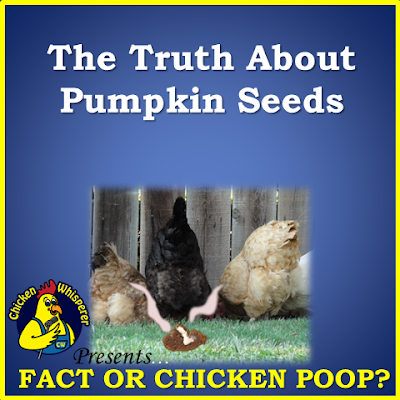"Provide
quality grit and there is no need to worm your chickens." -
Statement made by a fan on the Chicken Whisperer Facebook page posted on January
14, 2016.
Grit is not a poultry de-wormer. Grit consists of small stones that are
consumed by chickens to help with the grinding up of whole grains in the
gizzard. The gizzard is a very strong
muscle with a tough inner lining. The
grit simply adds surface area to the grinding that takes place in the gizzard to
make this process more efficient. With
most poultry feeds today, there are no whole grains and so grit is not
necessary. If you do not feed whole
grains, then not purchasing grit is a cost savings to the chicken owner. Chickens, if allowed to range in the yard or
the driveway, often pick up small stones and consume them. You will also see smaller bird species doing
the same thing (i.e. sparrows). Grit
eventually wears down to the point that it is small enough to leave the
gizzard. It then passes out in the
feces. Grit is not the same as oyster
shell. Oyster shell imparts additional
calcium to the bird’s diet and can strengthen eggshells during times of stress
when birds may be laying weaker eggshells.
At some point, someone suggested that grit scrapes
the worms or damages the worms to the point of causing them to be released from
the body. There is no evidence that grit
is effective in this way for poultry.
Some backyard chicken owners thought that grit was similar to food grade
diatomaceous earth (DE), which is only slightly effective against worms. Since both DE and grit are both come from the
ground, at some point some people equated the two as having similar uses. It should also be noted that on the internet,
pumpkin seed research on small ruminants, is being purported as a good, natural
de-wormer for chickens. There has been
no research done on the effectiveness of pumpkin seeds as a de-wormer in chickens.
There is only one over-the-counter chicken
de-wormer on the market and the active ingredient is piperazine. The brand names vary, but the active
ingredient is the same. It is added to
the water, not the feed. There are no
approved over-the-counter poultry de-wormers approved for the feed in the
U.S. Piperazine will not kill
worms. It simply makes them sleepy and
hopefully they will let go of the lining of the intestines. If, and when, they let go, they are pushed
out of the body through normal peristaltic action. That is why it is suggested
that birds receive a good dose of the medication followed a few hours later by
a thorough cleaning of the coop bedding because the feces are likely
worm-laden. The birds receive a good dose by taking their normal water away for
a few hours (depending of course on the time of year in case temperatures are excessively
high) and then put the medicated water into the coop. Keep the medicated water in the coop for a
few hours and then take it out. Wash the
waterer out with soap and water and then refill the waterer with fresh, clean,
cool water. Worms can still move in the
feces and it is important that the feces are cleaned up as the chickens are
likely to be attracted to the movement in the droppings. Re-infection via the fecal-oral route is a
common tactic used by internal parasites to ensure that they survive and pass
along their genes to the next generation.
That does not mean that there are no other products
out there. Some are herbal with no scientific
proof of the product’s effectiveness in different types of poultry under
different housing conditions. Be wary of
claims that point toward non-poultry research or claims that they are
traditionally accepted as de-wormers. If
the research has not been done with regard to 1) effectiveness against
different types of poultry internal parasites, and 2) withdrawal periods for
meat and eggs, then you are making a very large assumption that the product
will work in your situation.
There are products out there that are acceptable to
give to poultry with a veterinarian’s prescription and oversight. Prevention is the key as most backyard flock
owners do not want to give their chickens too many drugs. Many small flock owners get a small flock
because they believe that commercial production practices already use too many
chemicals. Commercial producers cannot afford to give their chickens
medications unnecessarily and so use biosecurity to their advantage as a
preventative measure. They also do not
expose their birds to sources of internal parasites. Some small flock owners expose their birds to
wild birds and insects which can either be intermediate hosts of internal
parasites or cause infection directly.
Therefore many small flock owners just want to be able to give drugs to
their flock monthly to prevent worms. This
may lead to a build-up of resistant worms, potentially reducing the
effectiveness of the only over-the-counter product currently available in the
U.S. To avoid giving your small flock
drugs unnecessarily, it is recommended that a sample of fresh feces be taken to
your veterinarian to have fecal flotation test be done. This test determines if worm eggs are in the
feces and a microscope is needed for this examination. Only if your chickens have evidence of worms
should you consider treating them with piperazine. The sheep and goat producers worldwide are
currently experiencing difficulties with a lack of available drugs and internal
parasites that are resistant to the drugs that remain available. No one wants a similar situation to occur for
small flock owners.
Response
provided by Dr. Brigid McCrea, Ph.D.
Associate Professor and Extension Poultry Specialist
Delaware State University






